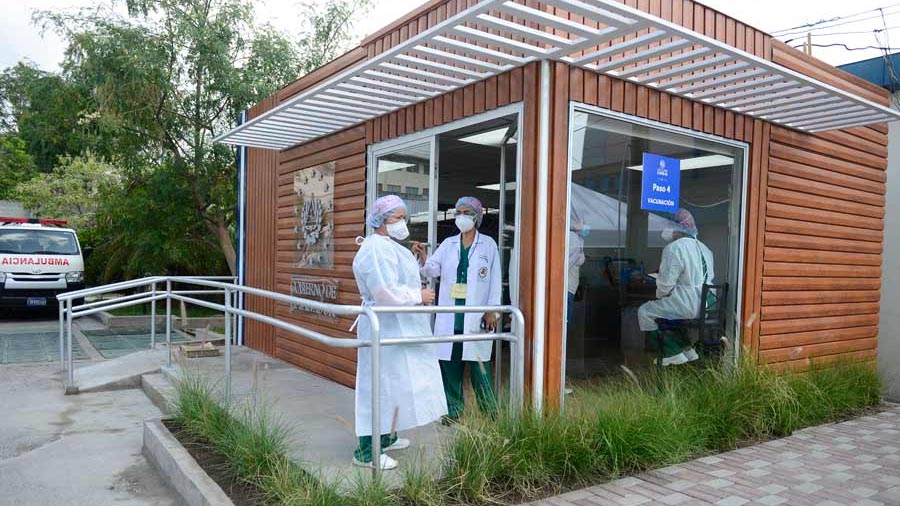
In addition to the purchasing processes, information about the registration of the stands and the National Vaccination Plan will not be available to the public for the next three years.
The Ministry of Health of El Salvador (Minsal) stated that information regarding the application and purchase of vaccines is completely reserved against Covid-19, prohibiting access to this data for periods of 3 to 5 years, according to a document that was consulted about this. Wednesday by Efe.
The Minsal Reserved Information Index, updated on March 11 on the transparency site, indicates that information on the “SARS-Cov-2 vaccine acquisition processes” will be subject to 5 years.
You can read: Health gives priority to military and police to apply vaccine against COVID-19
Public access to the “National Vaccination Deployment Plan” against SARS-Cov-2 “and the” Register of Huts for Vaccination Against SARS-Cov-2 “is reserved for three years.
The responsible units, according to the document, are the Purchasing and Procurement Unit, the National Directorate of First Attention Level, the National Center for Biological Medicines (Cenabi) and the Advisory Committee on Immunization Practices (CAPI).
The health portfolio justified the action in Section D of Section 19 of the Access to Public Information Act, which states that it is confidential information “that clearly endangers a person’s life, safety or health”.

The Healthcare portfolio justified the action in paragraph D of Section 19 of the Access to Public Information Act. Photo: EDH / Archives
This law specifies that the reserved information is the information “whose access is expressly restricted in accordance with this law, for reasons of public interest for a certain period of time and for legitimate reasons”.
This isn’t the only information pertaining to the covid-19 pandemic that the Minsal has kept secret.

According to the Transparency Portal, the “SARS-Cov-2 vaccine acquisition processes” will be subject to 5 years. Photo: Courtesy Transparencia.gob.sv
In June 2020, it declared the full reservation of the documentation generated by the National Public Health Laboratory “containing information regarding the mechanisms for collecting, processing and disseminating test results for covid-19, addressed to the various dependencies of the Department of State. Public health. . Health “.
Other information that has been stated by Minsal as tentative since President Nayib Bukele came to the executive branch includes the purchase of advertisements and the “The National Health Plan” document, including attachments, as recorded in the aforementioned index.
Also read: Private sector health workers seek COVID-19 vaccination alternatives in other countries
El Salvador has received at least 105 thousand 80 doses of vaccines against covid-19 from the pharmaceutical companies AstraZeneca (53 thousand 600) and Pfizer (51 thousand 480), of which 85 thousand 80 were donated by the Organization World Health Organization’s Covax system ( WHO).
The government of El Salvador is betting on “herd immunity” to deal with the pandemic and the Ministry of Health is aiming to vaccinate 4.5 million Salvadorans.
El Salvador officially registers 63,766 infected people, of whom 61,009 have recovered and 1,990 have died.
Responses to Information Blocking
Transparency experts confirm that this has implications for people’s right to be informed about matters related to their health and life.
“This information has no legal basis to be classified as reserved,” Wilson Sandoval, coordinator of the Anticorruption Legal Advisory Center (Alac-Funde), told El Diario de Hoy.
According to Sandoval, it is not enough to quote Article 19 of the LAIP. The government must justify it and it must respect legality, comply with reasonableness (demonstrate that the reservation actually protects the rights it claims to protect) and temporality (explain why Salvadorans are safer by not being able to disclose this information for the specified period ).
Xenia Hernández, director of the DTJ Foundation, condemned this reservation, recalling that the Inter-American Commission on Human Rights has called for information related to COVID-19, tests and vaccines to be made public and even unofficial. That is to say, it is available even when it has not been requested by the citizens.
“They should report proactively because it is very relevant data so that managing the pandemic has greater impact and outcome,” he said.
You May Interest: Blocking Vaccine Information Is Illegal and Prevents People from Knowing When and Where They Will Be Vaccinated, Experts Say